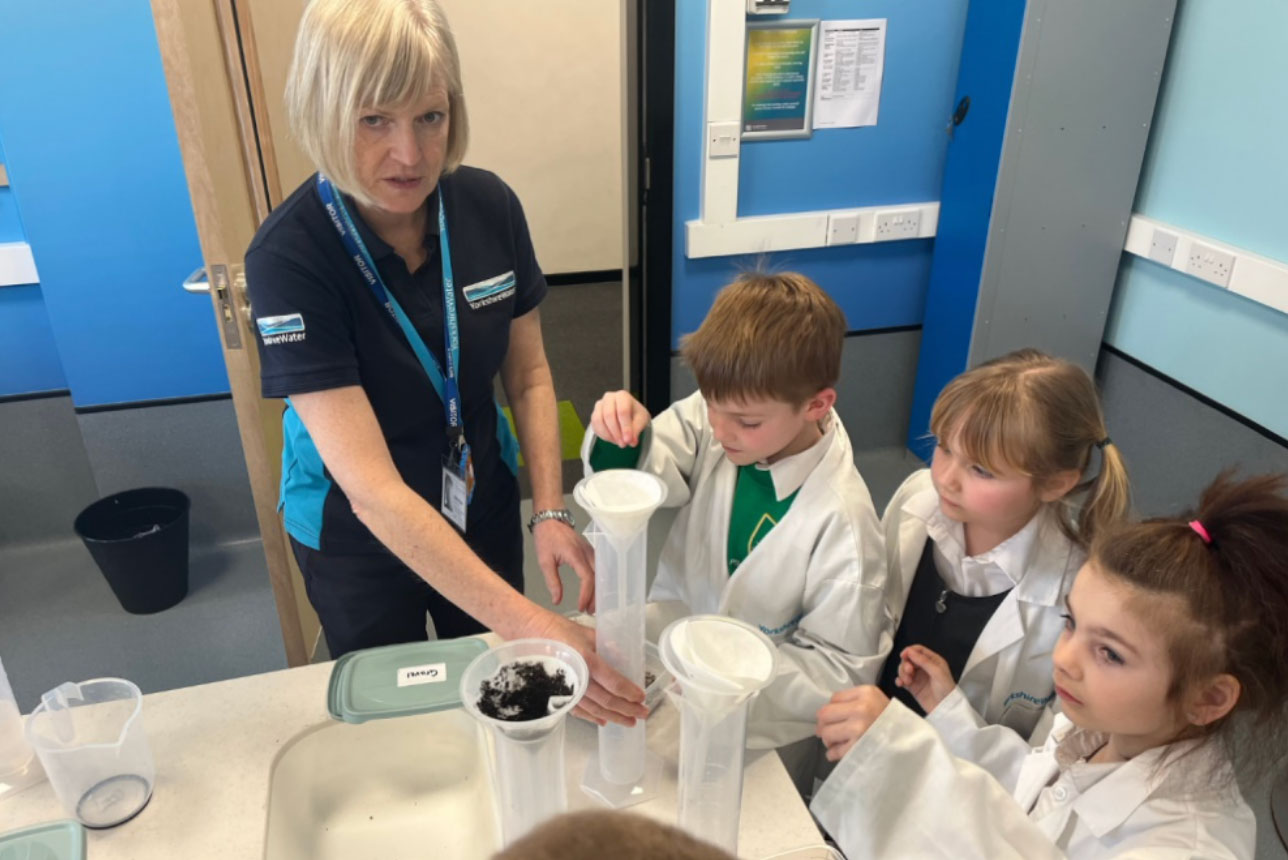Curriculum
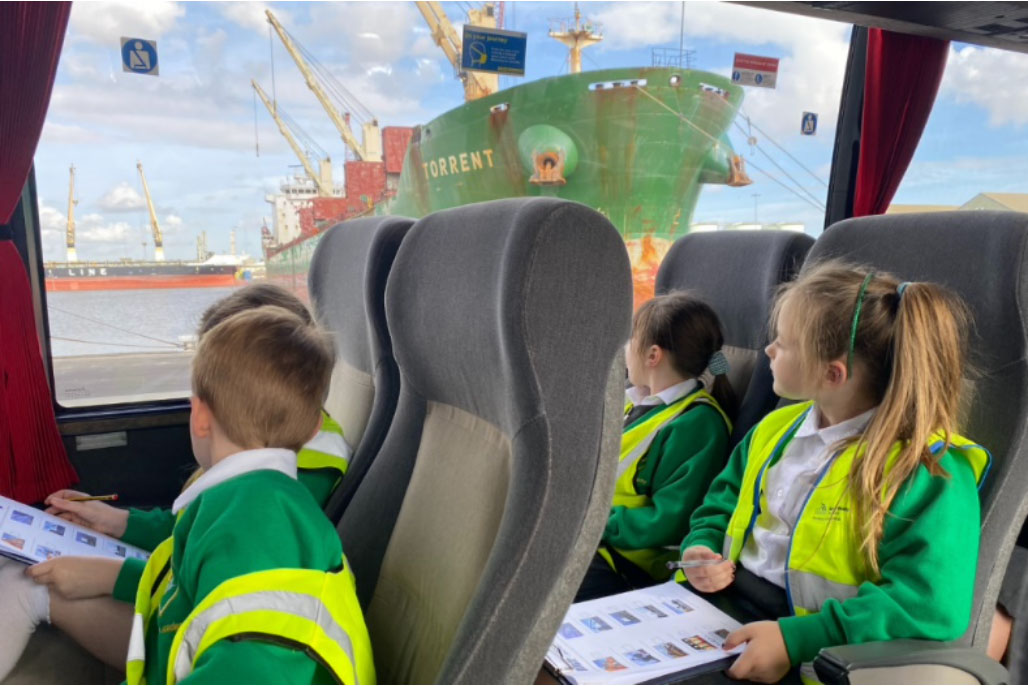
Curriculum Intent
Summary of general aims:
- We aim for curriculum content to be remembered in the long term.
- We intend for students to make progress by remembering more and knowing more.
When planning and designing the curriculum, we have considered the following main areas:
- How will our curriculum design provide students with opportunities for knowing and remembering deep knowledge?
- How can we provide breadth of knowledge within subjects, sequencing topics to develop deep knowledge over time, across key stages from Early Years to KS2?
- Does our curriculum design provide opportunities for all pupils, including those with SEND, to access a broad, balanced and engaging curriculum?
- What knowledge and skills do our pupils need to take advantage of opportunities, responsibilities and experiences of later life, giving them the cultural capital to be successful?
- What end points should our curriculum build towards and what do our pupils need to know to be able to reach those end points?
- What are the main features of the academy’s local context which we need to address to narrow gaps in our pupils’ knowledge and skills?
- What else can we offer, alongside daily classroom practice, to ensure our pupils are fully prepared for secondary education; have knowledge of the wider world and aspire to fulfil their ambitions?
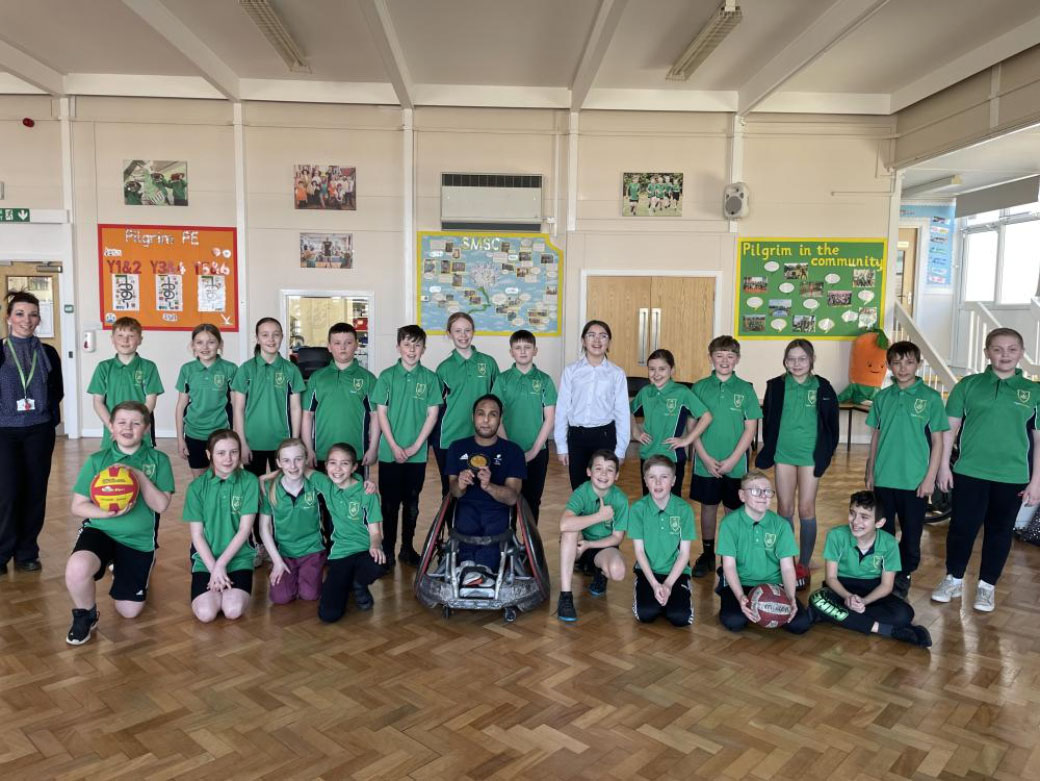
Intended depth of knowledge:
When we originally started re-designing our curriculum in 2019, we used the model set out through the Chris Quigley curriculum, as a basis and guide, to help plan and sequence some aspects of our curriculum in order to provide students with different types of deep knowledge. This has adapted over time and we have regularly updated and reviewed our offer over the last 4 years, though the fundamentals have stayed the same. It is based on the following:
Learning is a change to long-term memory, and everything in long-term memory is Knowledge. Types of Knowledge can be categorised in several ways.
Most of our learning revolves around the following:
Substantive Knowledge: established facts, e.g. the earth is the planet on which we live.
Disciplinary Knowledge: the methods that establish the substantive facts, e.g. observation of the sun, moon and stars, satellite photographs.
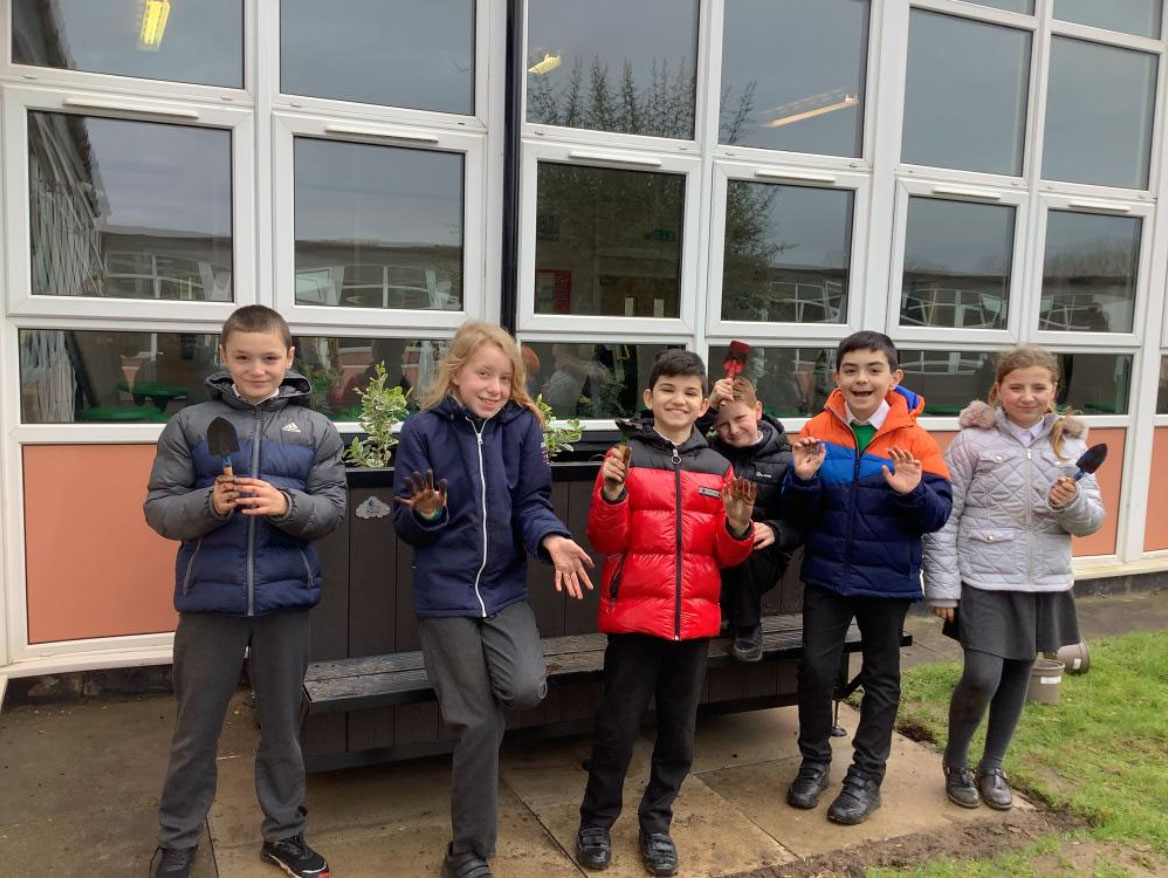
What are our ultimate goals?
The curriculum is organised to provide students with deep knowledge and skills to achieve cultural capital and success in life. Our curriculum aims to:
- Provide a broad and balanced education for all pupils;
- Be inclusive and accessible for all pupils, considering all ability ranges, including those with SEND, adapting lessons to meet all needs.
- Provide pupils with the ability to develop a deep learning of knowledge and the mechanisms for retrieving and applying knowledge.
- Ensure literacy is at the heart of everything, including embedding a wide and rich vocabulary across the curriculum.
- Inspire and challenge all learners to aspire to high achievement;
- Ensure pupils’ knowledge is fully developed to support their social, moral, spiritual and cultural awareness to promote diversity and key values;
- Develop pupils who are tolerant, respectful and understanding;
- Provide equal opportunities for all pupils, with high expectations for every learner ensuring appropriate levels of challenge and support;
- Develop key skills such as teamwork; independence, resilience; responsibility; and communication;
- Ensure pupils have a wide knowledge of career opportunities in a local and wider national context;
- Provide pupils with leadership opportunities to develop strength of character and self-confidence;
- Ensure pupils’ have wider opportunities to develop an interest and fascination in subjects and topics that interest them or that might interest them;
- Consider barriers to learning, linked to the local context and the circumstances faced by individual students;
- Promote an awareness of key issues such as healthy living; democracy and national and international events.
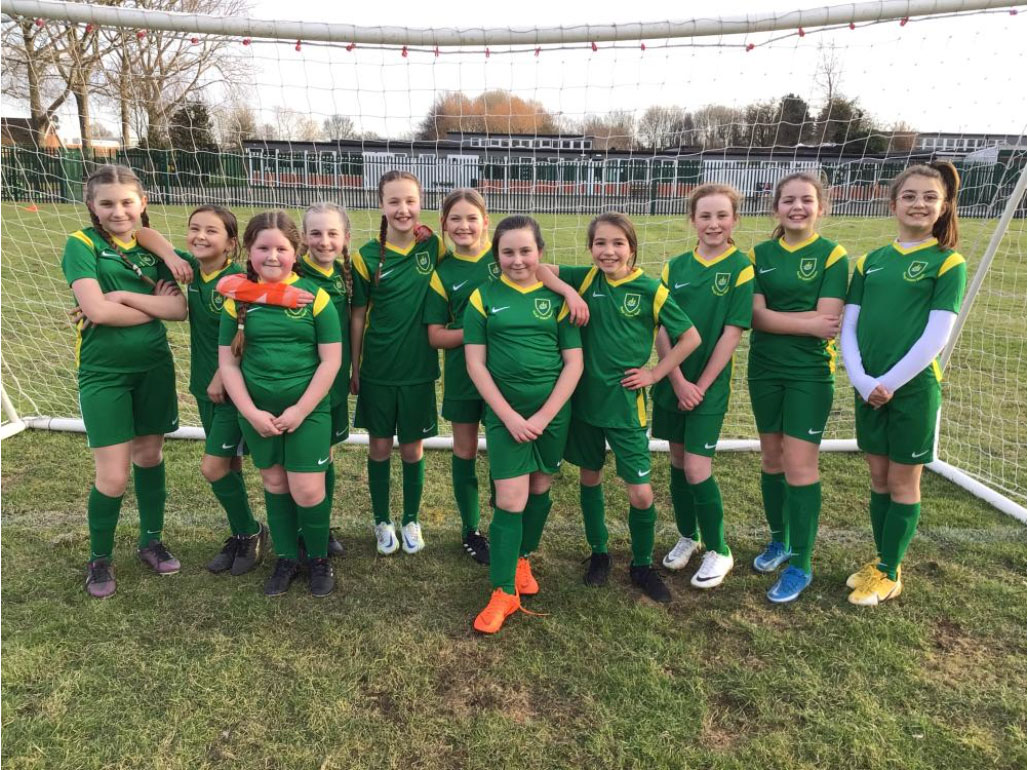
How does our curriculum intent reflect our whole school values?
At Pilgrim Academy, alongside the acquisition of deep knowledge, a key focus is to ensure that every child has the confidence and self-belief to know that there are no limits to what they can achieve. Our whole school values; Kindness, Courage and Respect are fundamental in our curriculum aims.
Courage: Every child knows that they can achieve anything if they have knowledge and self-belief and challenge themselves to be resilient thinkers and apply themselves to their full potential.
Kindness: Every child develops understanding and empathy for others and the world that we live in.
Respect: Every child understands how to be a responsible and thoughtful member of the school and wider community.
Our curriculum has been organised to inspire and challenge all learners to be part of an ambitious, broad and balanced curriculum. It is our aim that all children will be provided with wider opportunities to develop life-long learning skills and develop their own interests to succeed in the future.
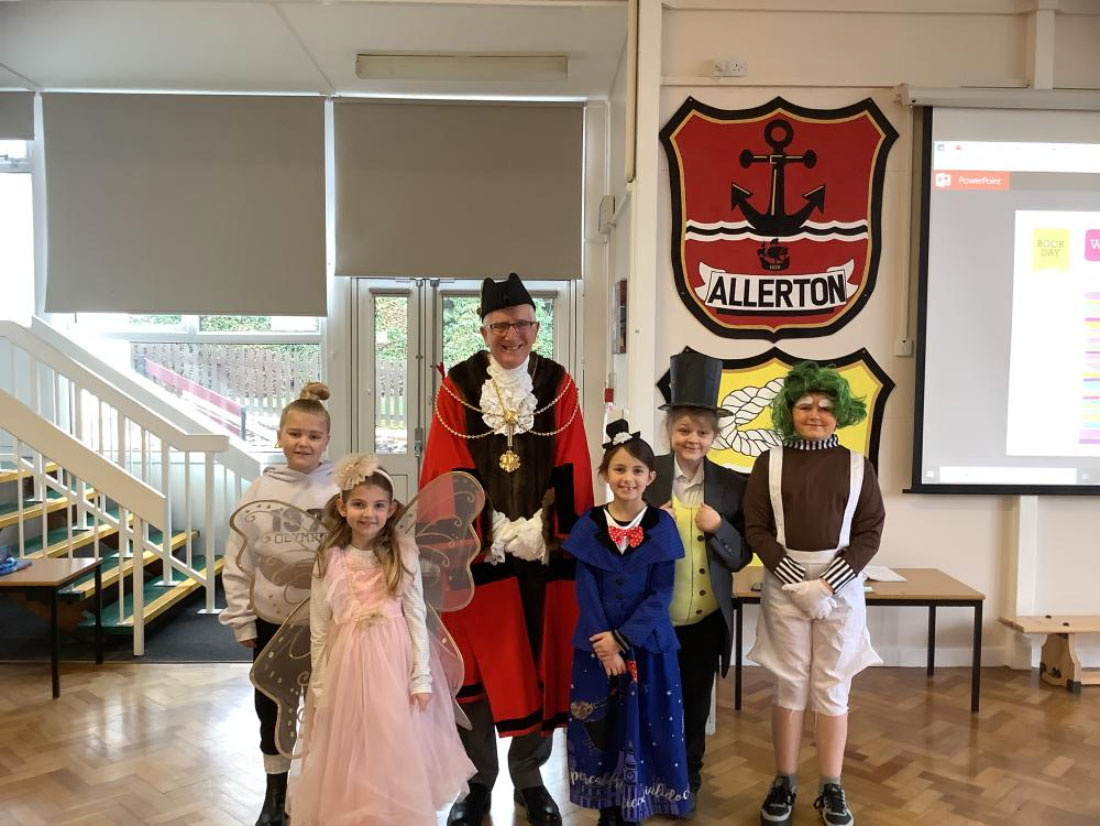
Curriculum Implementation:
What subjects do we teach?
We teach a full range of subjects to all pupils and ensure sufficient coverage is given to each area to ensure the pupils receive a broad and balanced curriculum. The subjects covered are:
- Art & Design
- Computing
- Design & Technology
- English
- French for KS2
- Geography
- History
- Mathematics
- Music
- Religious Education
- Physical Education
- PSHE
- Science
Where relevant, curriculum leaders have good knowledge of where these topics link to the EYFS curriculum.
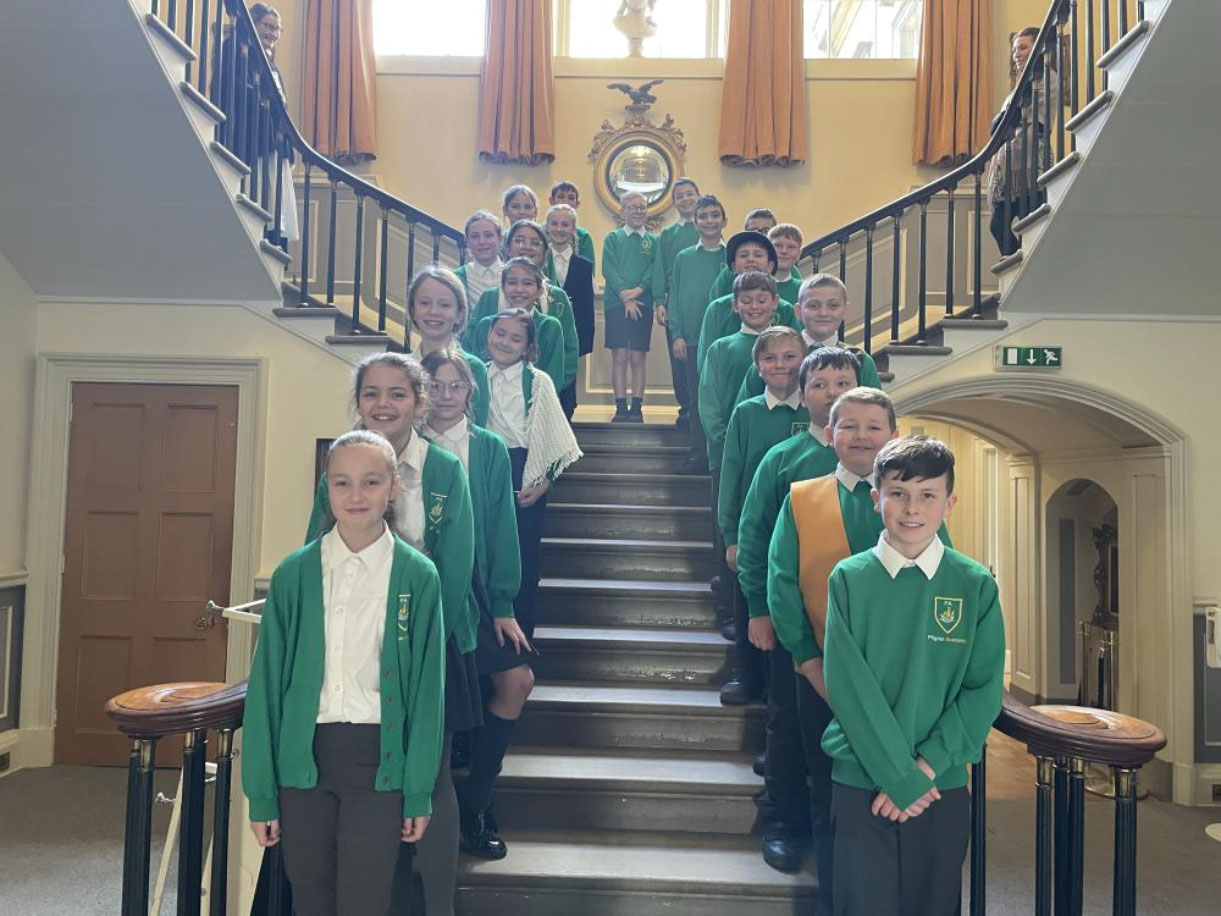
How is the timetable structured?
Having tried various models, including teaching through a thematic approach, we found that all methods had their strengths but often some restrictions. In September 2022, we designed a timetable and structure which allows sufficient and appropriate coverage to the wider curriculum subjects.
Each subject is timetabled for each pupil in KS1 and KS2. For example, pupils will have a Science lesson; History lesson; Music lesson etc.
However, our curriculum allows some flexibility. For example, in some subjects such as Computing and Art & Design, we would teach a double lesson every fortnight. We feel that this offers the chance for greater development of skills and knowledge due to the nature of the subjects and the resources involved. Also, teachers can use their professionalism to adapt lessons – for example, if they wish to extend a Mathematics lesson by 15 minutes, our timetable allows this to happen.
In addition, we have chosen to teach Design & Technology in a block, for example, at the end of each half-term due to the nature of the subject.
This design has been chosen to ensure pupils can access and be successful in areas where they might have a particular talent or where they can achieve more successfully than in traditional subjects. For example, where a child may struggle with reading, they may be a very talented musician or have a passion for History. In addition, this timetable structure enables all pupils to be fully prepared for transition to secondary education.
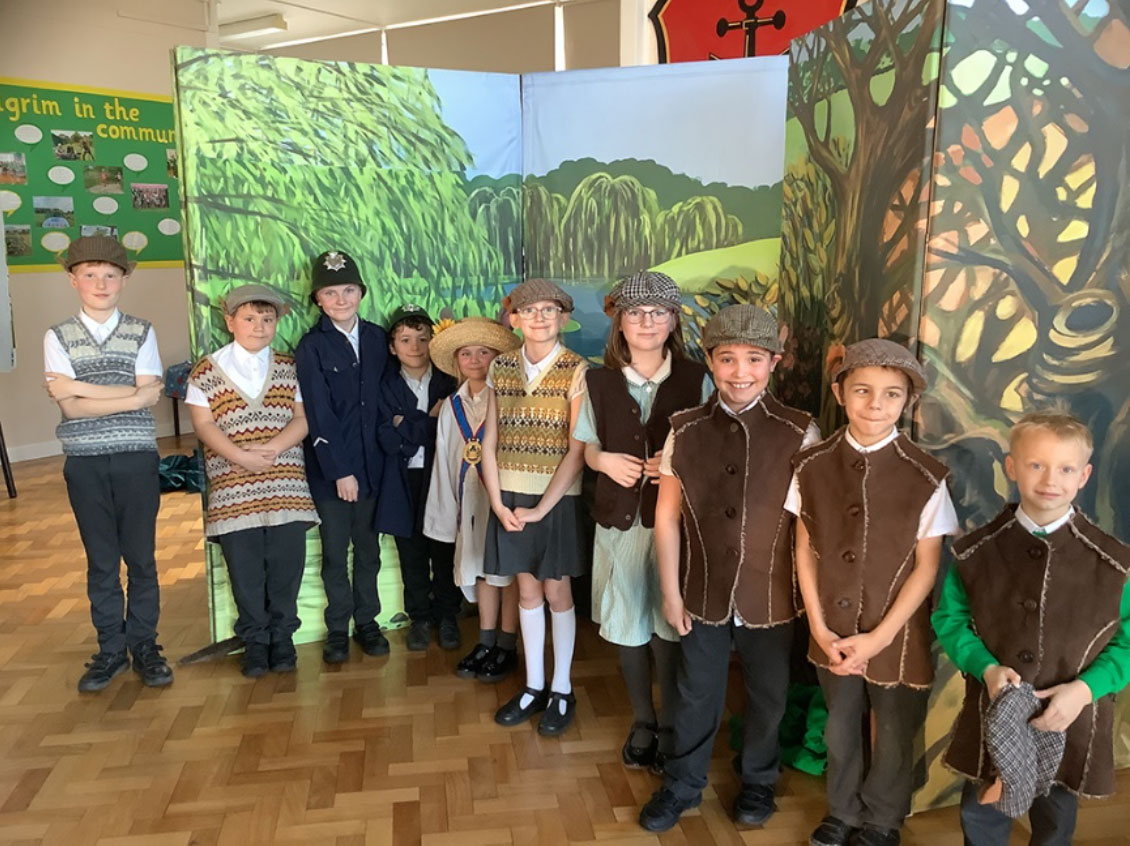
Do we follow any particular schemes?
We use a number of resources to support the delivery of our curriculum subject areas. For example, in September 2019, we started using elements of the Chris Quigley Essentials curriculum, where we used milestones to help teach and assess knowledge and skills taught across year groups. In September 2022, we started using a greater range of the Chris Quigley resources to help us enhance the teaching of detailed and deep knowledge and to further enhance our sequencing across certain subjects and across year groups, with an emphasis on remembering and knowing – this is the basis for History, Geography and Art & Design.
In addition, we use a wide range of resources across subjects. For example, we adapt the White Rose programme in Mathematics; we use Bug Club do deliver Phonics; Kapow to support our teaching of Computing and Music and Language Angels to support the teaching of French.
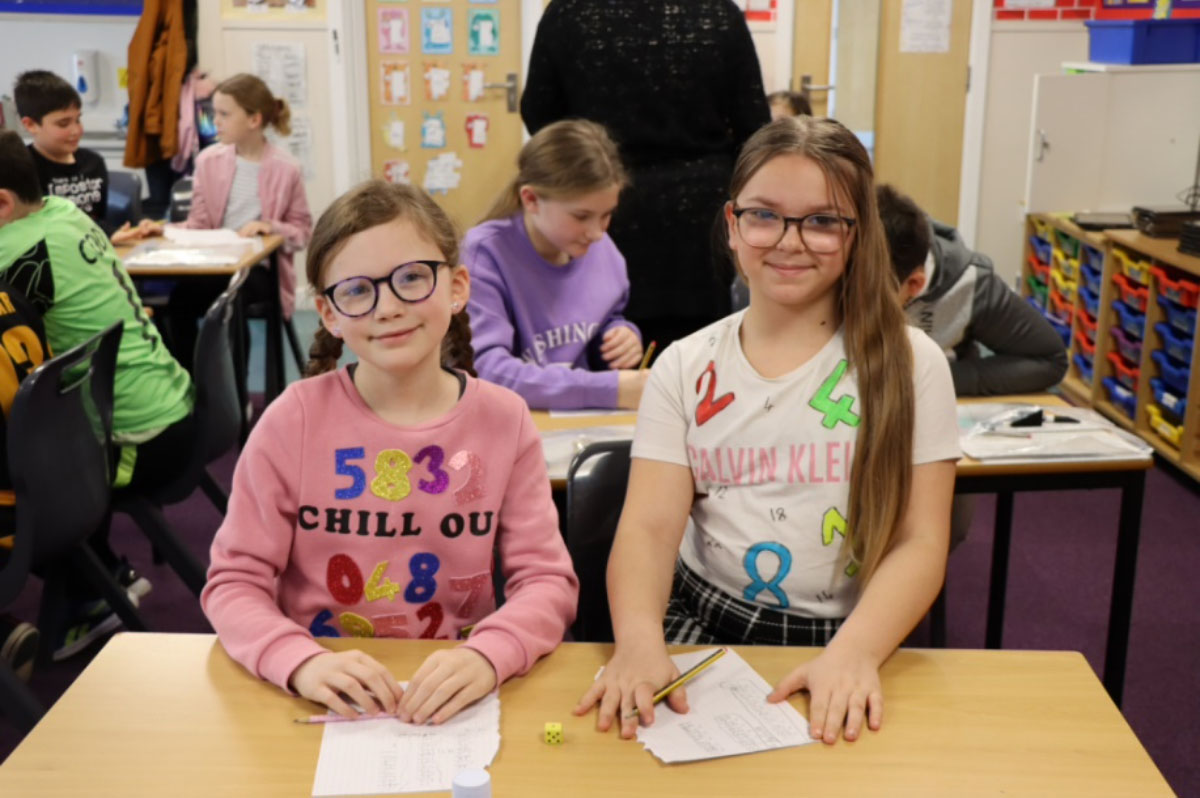
How do we teach and assess knowledge, providing students with the ability to know and remember deep knowledge?
Some of our wider curriculum subjects follow the methods outlined through the Chris Quigley Essentials curriculum, which we have adapted for Pilgrim Academy. The main principles largely run through other subjects too.
Our long-term and medium-term plans and whole academy mapping, are designed to provide breadth of knowledge and focus on key topics, each with key knowledge categories.
- For example, in History, we look at topics such as the Victorians, the Stone Age and World War II.
- Alongside this, within subject areas, we have schemas, which provide knowledge categories, which are common threads throughout a subject. For example, in Geography, the schema consists of location; physical features; human features; diversity; physical processes; human processes and techniques.
- These in turn, helps to provide intra-curricular themes and helps to sequence knowledge across the academy.
- The schema runs throughout each subject and across all year groups. This helps to sequence our curriculum. For example, in Art & Design, the following knowledge categories run across all year groups: Media and Materials; Techniques; Process; Colour Theory; Emotions; Artists and Artisans; Effects; Visual language and Styles and Periods.
We work on a two-year cycle, which allows for the re-visiting of topic areas, though with a different focus within each cycle. This allows for excellent retrieval opportunities and good opportunities to firmly embed deep knowledge over time.
For example, in History, in Years 3 and 4, we teach a unit on The Stone Age, Bronze Age and Iron Age, over a two-year period (the Autumn Term in both years). When the pupils go on to study the Romans and they focus on the building of such structures as the Colosseum, pupils will be able to make comparison with the work they will have completed in the Stone Age topic, which focuses on the changing nature of dwellings and settlements. Similarly, when the pupils focus on the development of bronze and iron to create new weapons for hunting and fighting, there will be scope for making comparisons with the nature of conflict used in the Crimean War (Milestone 1) and later, when they are looking at weapons used in battle, when studying the Romans (Milestone 2) and the Greeks and World War II (Milestone 3). In addition, a series of lessons focuses on the development of beliefs and religion, which again will help compare and contrast when studying later modules on the Romans and Egyptians (Milestone 2) and the Greeks (Milestone 3).
In addition, subjects have Threshold Concepts, which again, run across the subjects across year groups. These are the big ideas that underpin each subject area. For example, in Geography, the threshold concepts are: Investigate Places; Investigate Patterns and Communicate Geographically.
Throughout the teaching of individual topics, assessment opportunities are built in throughout. These are called POP tasks (Proof of Progress). For example, in Design & Technology, on the topic of 'Pneumatics,' pupils might be asked to:
- Describe the type of movement of a piston.
- Define the word compressed.
Planning Documents:
In June 2023, we began developing and using new planning documents in Art & Design, History and Geography which have greatly helped in sequencing within topics and across the two-year cycle. In the example below, you can see how there is focus on developing substantive and disciplinary knowledge over a two year period.
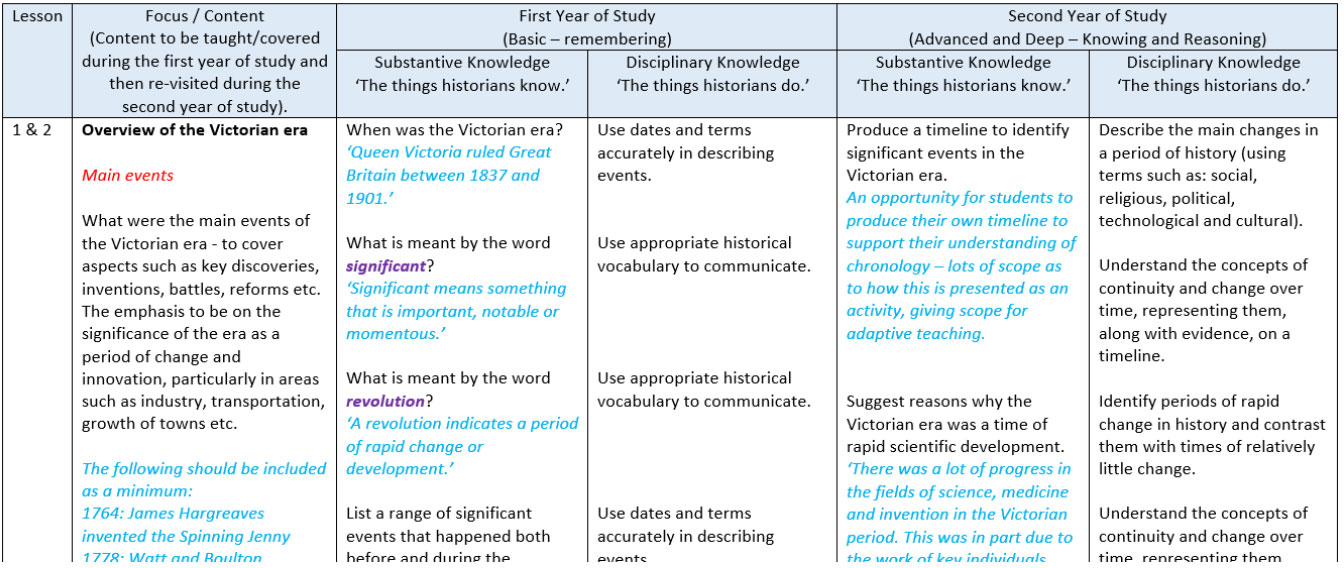
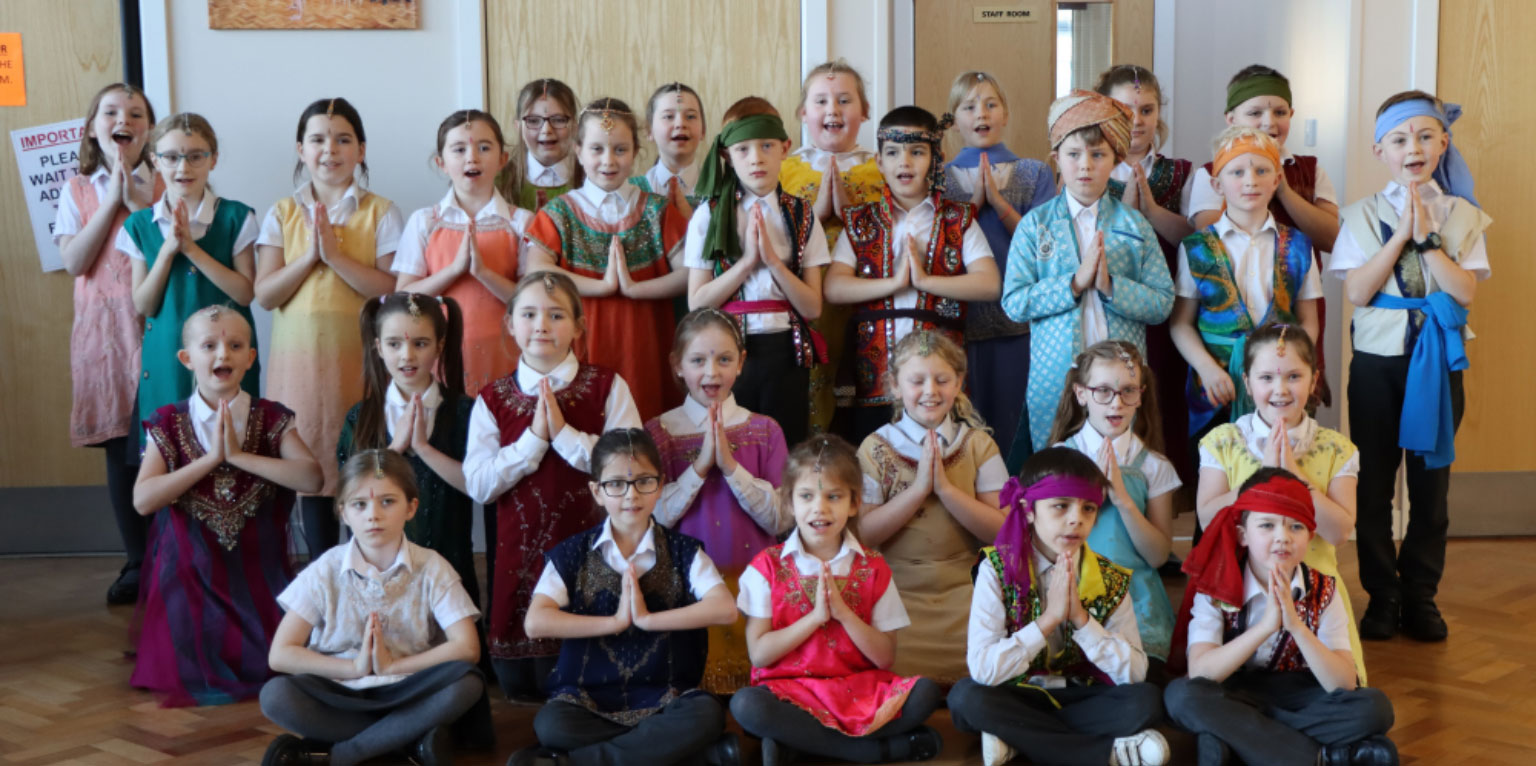
How do we ensure knowledge is secure?
Assessment opportunities are built in throughout each topic. This will mainly be in the form of on-going assessments in lessons and throughout topics, though may also end of topic tests to assess knowledge. Lessons are structured to give students constant opportunities to retrieve knowledge, through simple questioning and a wide range of activities. There is a focus on constant re-visiting of knowledge both from recent and less recent lessons, to help constantly retrieve and build a bank of deep knowledge that can be recalled.
The intention is to build up this knowledge across year groups. For example, in Year 1, students will look at knowledge categories of location, physical features and human features when studying The United Kingdom in Geography – those same knowledge categories will be taught through the topic of Continents and Oceans – thereby, giving the students the opportunity to make links and remember/retrieve knowledge from previous work.
Topics are mapped and sequenced across each subject and each year group so as to build on prior knowledge.
We use milestones at the end of each phase, which inform what knowledge and skills should be taught across each milestone. These are linked to national curriculum requirements and link to our on-going assessment. In some subjects, we have started preparing exemplar responses to support staff with expectations and to help children aspire to high quality outcomes. Using the same example as outlined above, below is an example of such exemplar responses:
- ‘Do you agree that the invention of the steam engine was the most important innovation of the Industrial Revolution period? Give reasons for your answer. ‘Though there were many key inventions and innovations that led to the Industrial Revolution, it is clear that the invention of the steam engine was the most significant. Firstly, as coal was needed to heat water to make steam, factories were opened near to supplies of water and coal which led to the growth of large, important towns in areas such as the Midlands and the North West of England…’
- Describe what life was like in factories in Britain during the early period of the Industrial Revolution. ‘In the 1800s, it became common place to employ women and children to work in factories. Conditions in many factories were challenging and often dangerous. For example, children often had to work 12–14 hour shifts, 6 days a week. In addition, there was little safety equipment, so children would often get injured or killed by fast-moving machinery…’
Other subjects who do not follow the Chris Quigley pattern use the same methodology to assess. Teachers and curriculum leaders then use this knowledge and data to inform future planning.
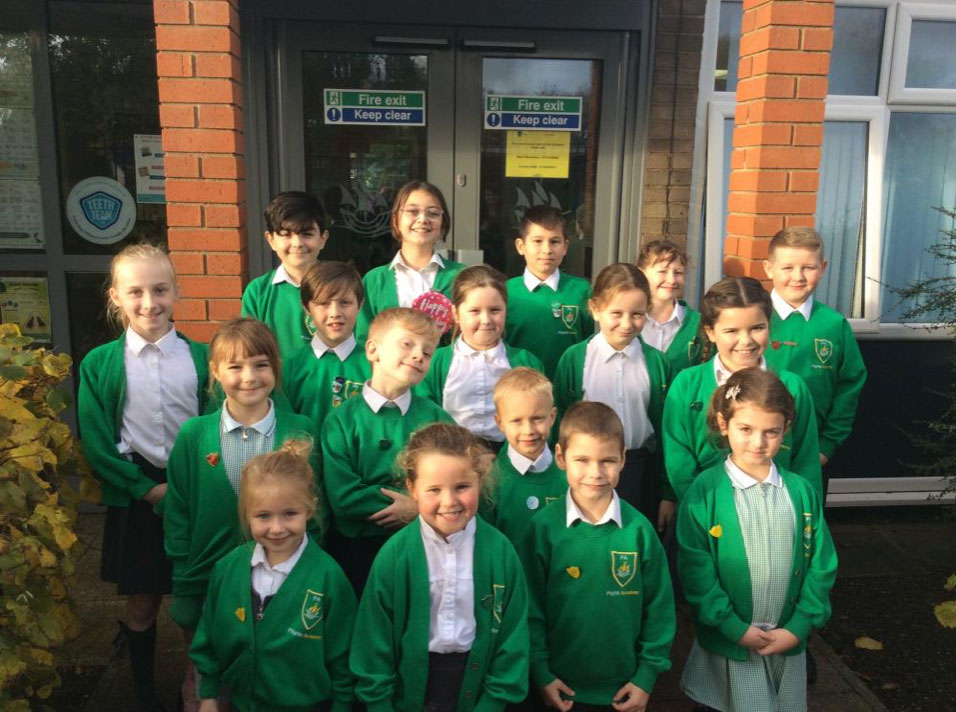
Do we use knowledge organisers?
Teachers use detailed knowledge organisers for some of our wider curriculum subjects which link directly to the assessment tasks for each topic. An amended ‘pupil-friendly’ version is provided for the pupils as a basis for topics but not as a full-proof guide.
Included is key vocabulary which focuses on everyday words; academic and elaborative words and subject-specific words. Key vocabulary is also built into the newly designed planning documents.
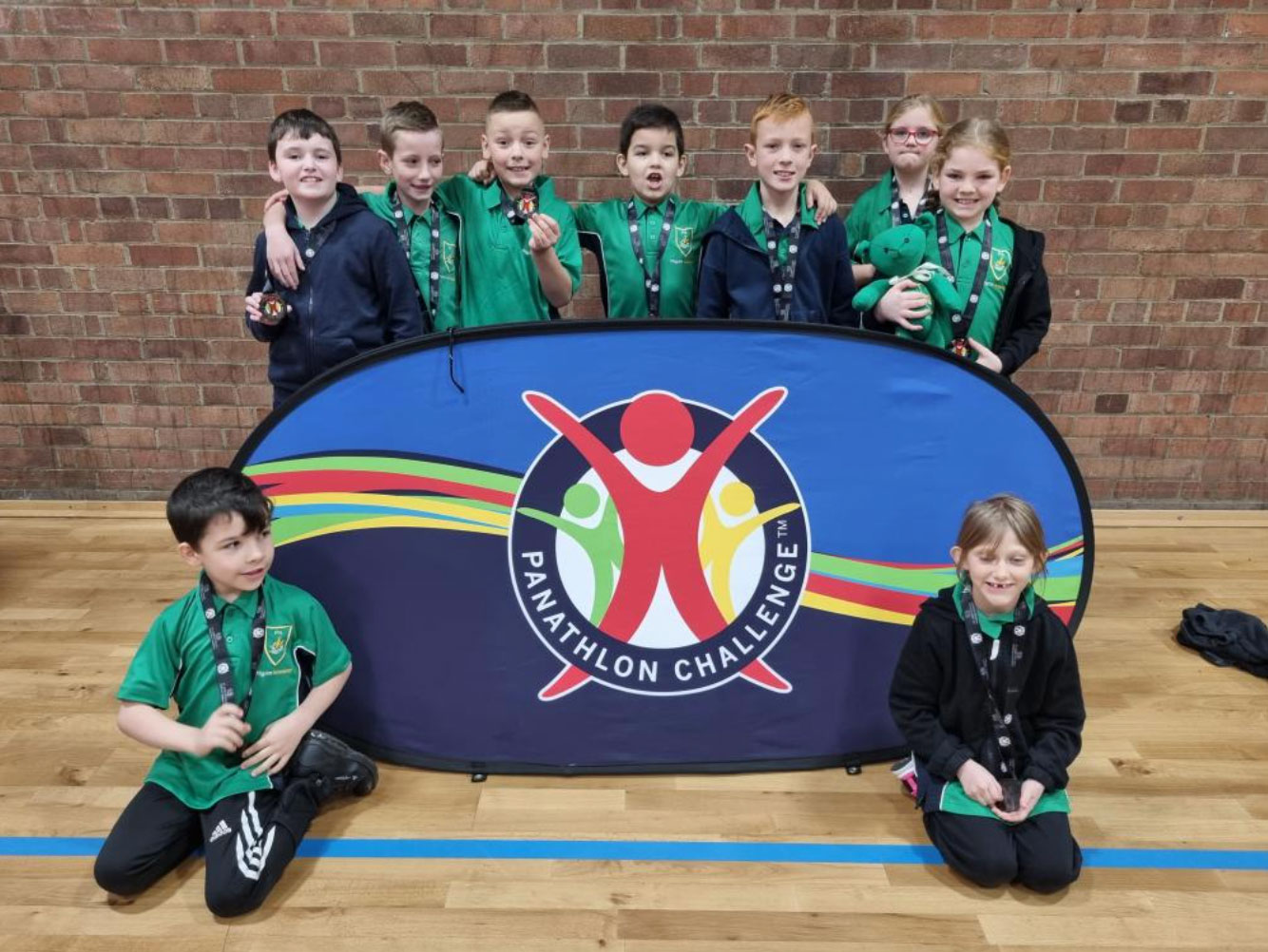
How do we ensure the curriculum meets the needs of all pupils?
Our curriculum has been designed to be accessible for all pupils. Each topic and individual lesson is adapted to cater for individual needs.
Part of the rationale for this approach is that it provides a range of different opportunities for all abilities, while still accessing the same topics. For example, in some subjects, assessment opportunities are based on the following:
- Basic (remembering)
- Advanced (knowing)
- Deep (reasoning)
This ensures that teachers can provide assessment opportunities for a range of abilities, adapting work to ensure that all pupils, including those with SEND, can access topic areas and achieve at their own pace.
Part of our motivation for giving adequate coverage to all curriculum areas is to ensure that there are opportunities for pupils to express themselves; achieve; enhance talents, in areas where they might shine e.g. art, science, history, PE.
Teachers will use a range of resources, including interactive displays and working walls, alongside individual resources and scaffolding techniques to help all pupils access the curriculum.
Interventions are in place to support pupils, where necessary.
Much of our CPD over the last 18 months has focused on adaptive teaching, using latest guidance such as that set out through the EEF.
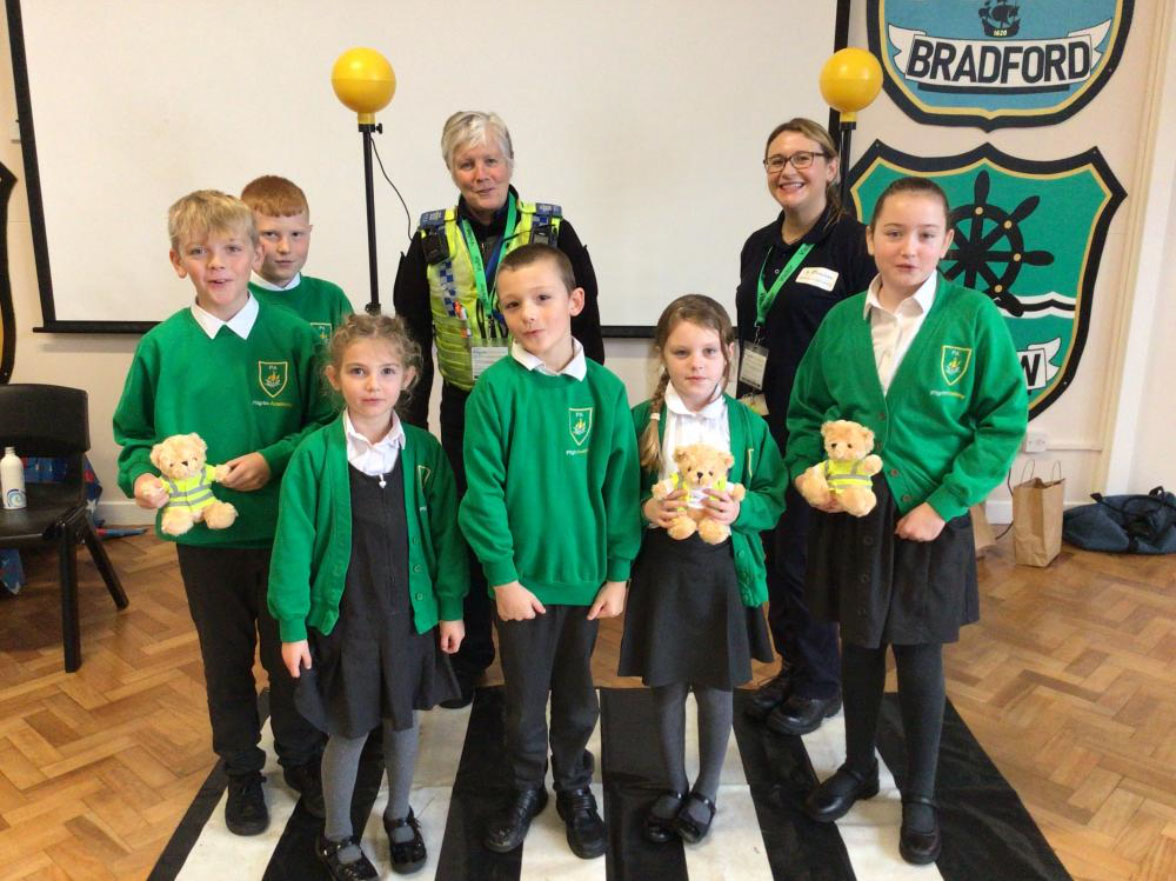
What role does enrichment play to deliver key aspects of our curriculum intent?
Enrichment is a key part of the implementation of our overall curriculum.
We offer a wide range of after school clubs which are available to all pupils at no additional financial charge. Recent examples include cheerleading; choir; football; netball and gardening.
External visitors help to inspire and develop cultural capital. For example, we have held workshops hosted by an international free-style footballer; a Commonwealth athlete and a local author. In addition, we hosted the English Heritage Society, who delivered workshops on local Viking History.
Opportunities for parental engagement are key. For example, we have organised a Race for Life event attended by over 200 family members, raising over £1600; we raised over £500 through a cake sale, where parents provided over a 1000 cakes and we organised for parents to attend performances by our choir and cheerleaders.
Outdoor learning is also a key focus, supported by our new gardens; ponds; wildlife areas; outdoor classroom and Wildlife Warriors. It is also our long-term plan to achieve Forest School status.
Assemblies also play a key role in the implementation of our curriculum. Alongside special mentions assembly, celebrating success, we also hold weekly singing assemblies and a weekly assembly which focuses on a local or national event, using resources supplied by Picture News.
We also build time in to our curriculum for whole class story time to help promote a love of reading.
In 2022, we achieved the Silver Sports game mark award. Participation in external competitions is a key focus and a significant number of our children regularly take place in local competitions, supported through after school clubs and use of the Sports premium funding to support enrichment and resources.
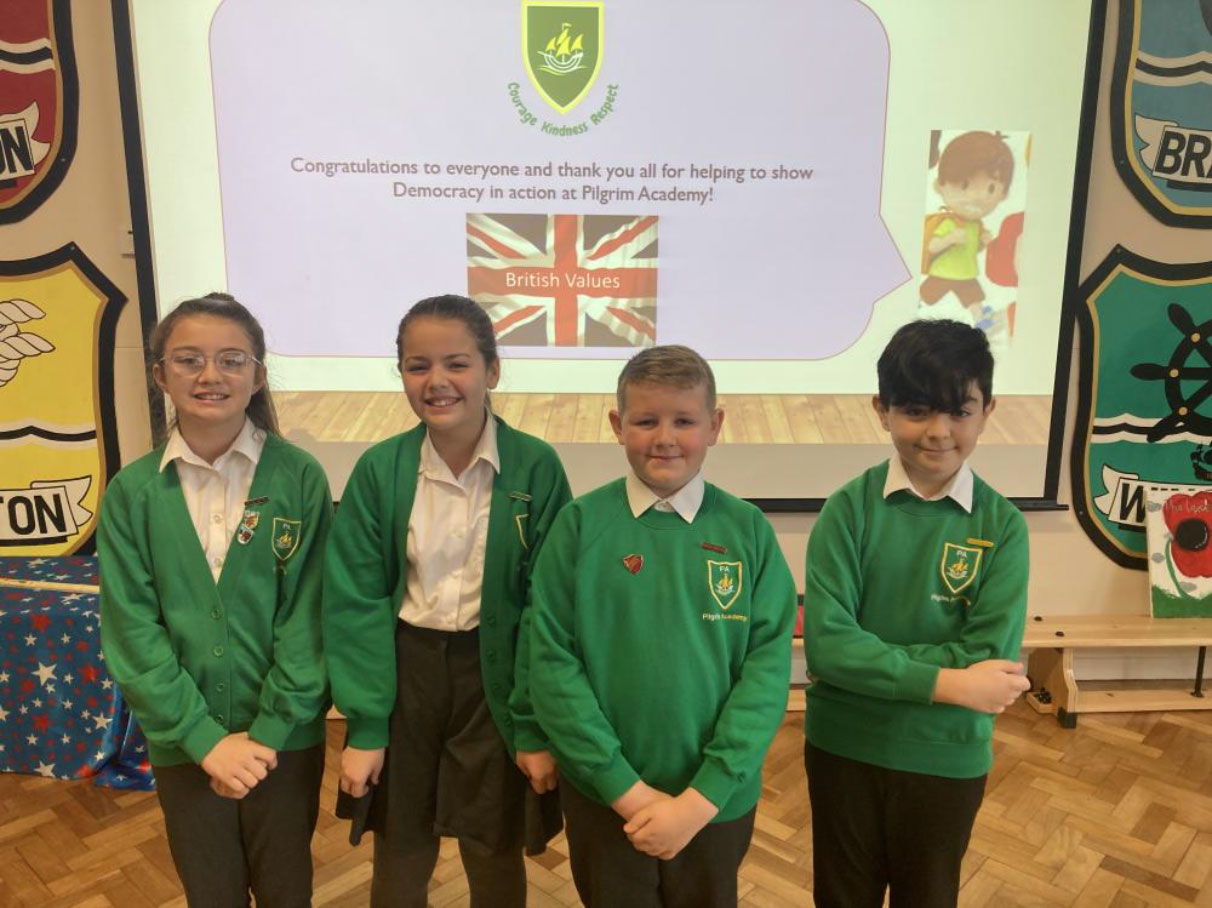
How do we ensure SMSC, British values and an understanding of the protected characteristics are a key focus for our pupils?
In 2024, Pilgrim Academy was awarded the Gold SMSC quality mark for schools.
We had nominated a curriculum leader to oversee this area to ensure SMSC permeates through all aspects of school life. For example, it is prominent through subject areas, such as RE and PSHE but also far more widely through most curriculum subjects, including History and Geography.
SMSC also flows though enrichment; leadership schemes; links with the local community etc. Children are encouraged to be leaders and learn key British values such as tolerance, democracy and the rule of law; children are taught to respect and appreciate different religions, cultures and British Values within their learning. This is achieved through the curriculum, assemblies, enrichment, visits and visitors as well as participation in local and national events.
In turn, the above helps to embed an understanding of the importance of the protected characteristics.
Leadership opportunities include whole school council; house captains; playground monitors; playground buddies; reading buddies and library monitors.
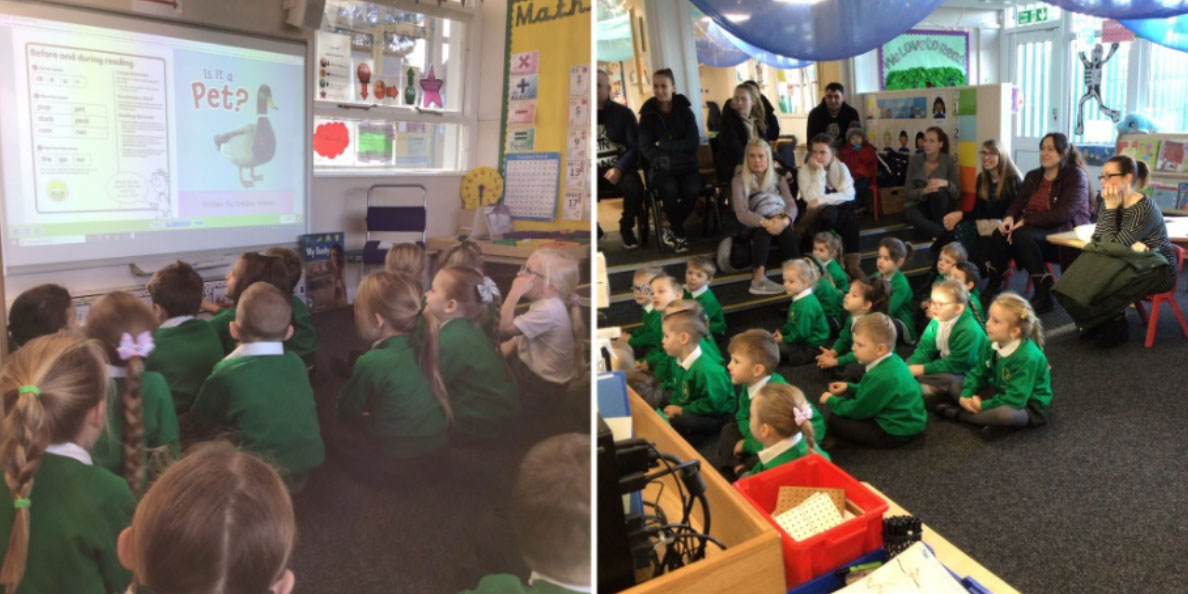
What steps do we take to support our pupils with an understanding of career opportunities, helping them to aspire to achieve whatever they want to achieve?
Linked to the above, we strive to make links with our local community, including businesses and employers.
For example, all pupils recently visited the Immingham docks for a full guided tour, organised by APB Immingham Ports; as part of a Primary Engineer programme, we were visited by members from Equans, who talked to pupils about life as an engineer; our Year 1 pupils attended a workshop on bricklaying, as part of their topic of looking at the Three Little Pigs.
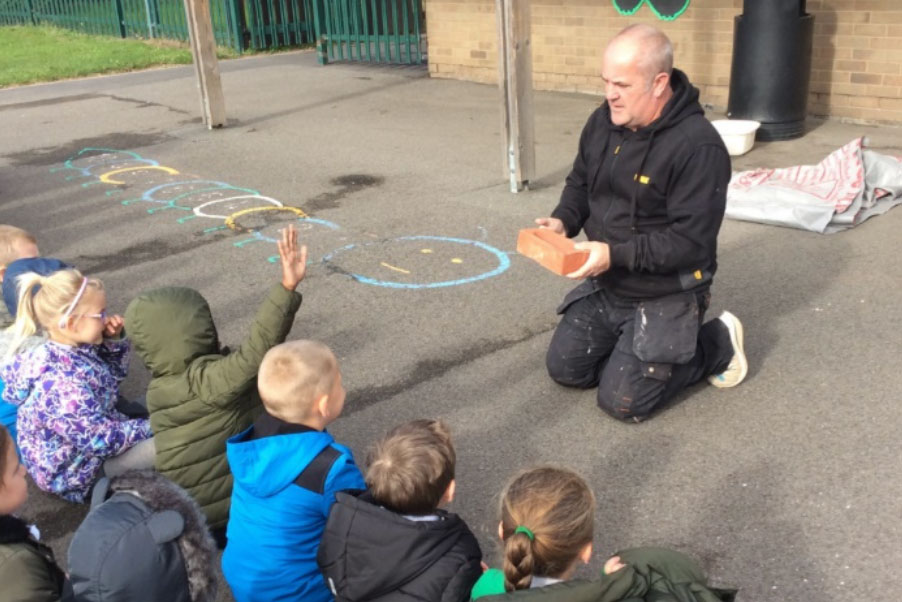
How do we celebrate our pupils' successes, helping to develop confidence and build self-esteem?
We use a variety of methods to celebrate and reward success. These include weekly Special Mentions assemblies, attended by parents; daily social media posts; regular news items on our website; use of our on-line Carrot Reward system, amongst many daily systems employed by staff.
Curriculum Impact
- Outcomes, for all pupils, will improve at the end of each key stage, including EYFS, and every student will make progress across the curriculum;
- Pupils will have developed a deep understanding of different types of knowledge to support everything outlined in our curriculum intent;
- Every subject and topic area will have a clearly defined end goal and assessment opportunities throughout the unit will indicate the development of substantive and disciplinary knowledge;
- The wider enrichment and extra-curricular programme will have supported the development of every individual, giving them the cultural capital to be successful in the next stage of their education, whilst looking beyond to later career development;
- Links with local industries and businesses will have supported students in giving them knowledge of opportunities, both local and national;
- Barriers to learning will have been considered and addressed, particularly in relation to combating any issues raised by the local context of the academy, and particularly in relation to any students with additional needs and/or for whom the academy receives additional funding;
- Aspirations have clearly been raised so every pupil leaves Pilgrim Academy, knowing that they can be successful in whatever they want to achieve in life;
- Students are tolerant, caring, understanding and active local, national and global citizens.
